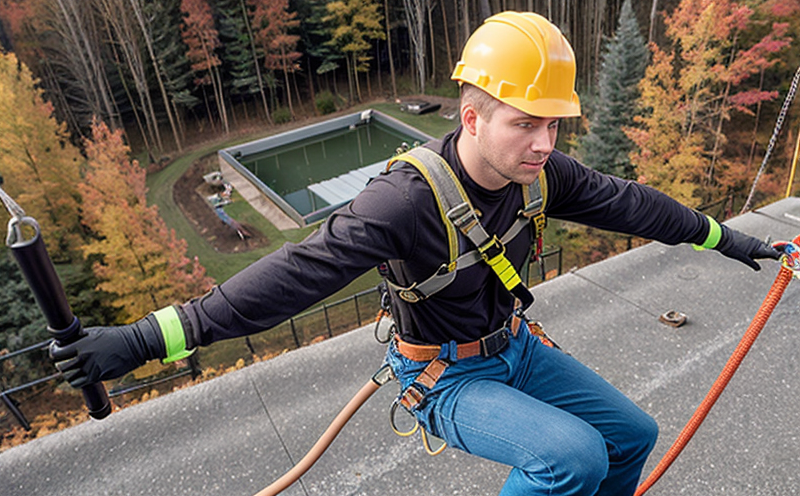CSA Z259.2.1 Lanyard Performance Testing
The CSA Z259 series of standards is a set of guidelines developed by the Canadian Standards Association (CSA) for personal fall arrest systems, including lanyards used in industrial and occupational safety applications. The specific standard we focus on here is CSA Z259.2.1, which pertains to the performance testing of lanyards.
Lanyards are critical components of fall protection systems that prevent workers from falling from heights by absorbing impact forces through elongation during a fall arrest. Properly designed and tested lanyards are essential for ensuring worker safety in various industries such as construction, manufacturing, and utilities. The CSA Z259.2.1 standard provides detailed requirements for the performance testing of these lanyards to ensure they meet stringent safety standards.
The test protocol outlined in this standard is comprehensive and includes several key parameters that must be met for a lanyard to pass:
- Static Elongation Test: This tests the ability of the lanyard to elongate under static load, which simulates real-world conditions during a fall. The standard specifies precise criteria on how much elongation is acceptable.
- Impact Force Testing: During a simulated fall, the impact force experienced by the test dummy (representing the worker) must not exceed predetermined limits to prevent injury.
- Elongation Over Time: The lanyard's ability to maintain its elongation properties over time is also evaluated. This ensures that the lanyards remain effective throughout their intended service life.
The testing process involves rigorous procedures to ensure accuracy and reliability. Specimens are prepared according to the standard, which includes conditioning them under specific environmental conditions before undergoing the actual tests. The use of advanced instrumentation allows for precise measurement of forces and elongation during the test runs.
After the tests, detailed reports are generated that include all relevant data points from each trial run. These reports serve as crucial documentation that can be used by quality managers, compliance officers, and R&D engineers to ensure ongoing adherence to safety standards. Reporting also plays a vital role in supporting procurement decisions related to fall protection equipment.
The importance of thorough testing cannot be overstated; it ensures not only the immediate safety of workers but also long-term reliability under various environmental conditions. Compliance with these stringent standards is essential for maintaining a safe work environment and avoiding potential legal liabilities associated with non-compliance.
Why It Matters
The importance of CSA Z259.2.1 lanyard performance testing cannot be overstated, especially in industries where workers are exposed to the risk of falls from heights. Properly designed and tested lanyards play a crucial role in preventing injuries and fatalities during workplace accidents.
Failures in fall protection systems can lead to severe injuries or even death. By adhering to strict testing protocols, manufacturers ensure that their products meet the highest safety standards, thereby protecting workers' lives. Compliance with these standards also contributes significantly to enhancing company reputation by demonstrating a commitment to worker safety and regulatory compliance.
From an operational perspective, consistent use of tested lanyards helps reduce downtime due to accidents and improves overall productivity. It fosters a culture of safety among employees who know that their equipment has been rigorously evaluated for performance and reliability. Furthermore, it aligns with broader corporate goals aimed at fostering a healthy workplace environment.
The rigorous nature of CSA Z259.2.1 ensures that only the highest quality lanyards reach the market. This not only protects individual workers but also contributes to safer working environments across all sectors where fall protection is necessary. By investing in proper testing, companies can significantly reduce risk and enhance their commitment to safety.
Benefits
The benefits of CSA Z259.2.1 lanyard performance testing are manifold and extend across multiple dimensions including worker safety, regulatory compliance, operational efficiency, and reputation management:
- Enhanced Worker Safety: Rigorous testing ensures that only high-quality lanyards enter the market, reducing the risk of accidents and injuries.
- Regulatory Compliance: Meeting these standards helps companies avoid penalties and legal issues associated with non-compliance.
- Operational Efficiency: Reliable equipment minimizes downtime due to failures, leading to increased productivity.
- Reputation Enhancement: Demonstrating a commitment to safety through stringent testing can significantly boost a company’s reputation and trustworthiness.
In addition to these tangible benefits, adhering to such rigorous standards also fosters an organizational culture of continuous improvement. Companies that prioritize comprehensive testing are better positioned to innovate and improve their products continuously, ultimately contributing positively to the industry as a whole.
International Acceptance and Recognition
The CSA Z259 series is not only recognized in Canada but has gained widespread acceptance internationally. The standards have been adopted by numerous countries, organizations, and international bodies due to their comprehensive approach to personal fall arrest system safety.
For instance, the European Union's standard for fall protection equipment, EN 361, draws heavily from CSA Z259 principles. Similarly, other regions like Australia and New Zealand have incorporated similar testing protocols into their national standards. This international recognition underscores the value placed on these stringent safety measures.
The global acceptance of these standards reflects a growing awareness among organizations about the critical role played by fall protection systems in maintaining workplace safety globally. By aligning with internationally recognized standards like CSA Z259, companies demonstrate their commitment to adhering to best practices and ensuring consistent quality across different regions.





